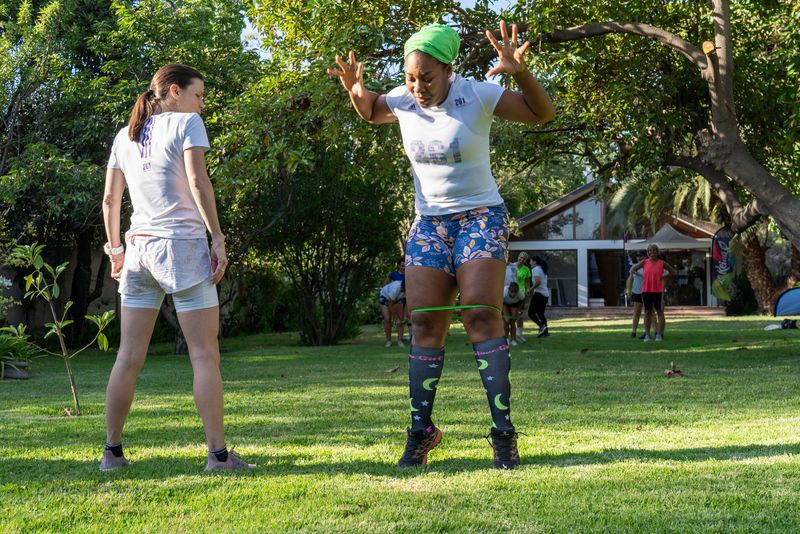Around 1 in 3 women suffer urinary stress incontinence and it’s a huge barrier to exercise, particularly high impact activities such as running. If we want to get more women running, it’s crucial to address this important barrier to activity.
Urinary incontinence is common but it’s not normal and treatment is available - in nearly most of the cases simple pelvic floor training is sufficient. About 85 per cent of women who complete a treatment plan for stress urinary incontinence will be leak free at the end. It’s thought that the figures for incontinence are much higher than reported, women just don’t want to admit they suffer from it. Providing a safe space for women to chat about their bladder health is vital. A relaxed and supportive environment where conversations on uncomfortable or embarrassing topics are normalized goes a long way to help women access the information and help they need. This is exactly what you’ll find at a 261 Fearless weekly Meet Run.
“As a post-menopausal woman with bladder problems I feel really comfortable exercising in my 261 group. There’s no issue if I have to find a bush to nip behind. The members make sure I don’t get left behind. It’s good that the Coaches have had some pelvic floor training, it’s so important for women of all ages.” Janet, member at 261 Club UK – Lancaster.
261 Coaches receive ongoing education (Empowerment Classes) on a wide range of women’s health topics. A recent class was led for us by world-renowned women’s health physiotherapist Emma Brockwell. Emma explained that although doing pelvic floor exercises (Kegels) properly and regularly is crucial for good pelvic health, we need to do more than just keep squeezing. She explained to our Coaches how to strengthen major muscle groups that support the pelvic floor and how to encourage a good running technique that minimises the pressure put onto the floor. These tips will help women who already have some weakness but also help our members to protect their pelvic floor and prevent developing urinary incontinence in the future.
Women don’t need to volunteer the information that they have a weak bladder at Meet Runs. The Coach will know from the statistics and her 261 education, that at least two or three women in the group, and more if she has a group of women over 50 years old, will suffer urinary stress incontinence. Our 261 Coaches know that when they ask their members to do star jumps for example, they always need to give a low intensity option that doesn’t involve jumping. Some women are asked by their physiotherapists to stop high intensity exercise while they rehab their pelvic floor. 261 members know that this won’t be a problem, they won’t be judged for choosing low intensity work and that they can walk if they need to.
Making sure there is access to a toilet, offering low impact exercise variations and even incorporating pelvic floor exercises into the Meet Run, is something all 261 Coaches are used to doing. They also know about the importance of signposting to local services to access advice and treatment if a woman does talk about leaking urine.
“I feel 261 is in a great position to both help prevent bladder weakness and to support women experiencing it. After three children, a gradual but significant weight increase and a sudden early menopause at 43 years of age, I wanted to get fit again so I joined 261 Club Lune Valley. As my running improved, I got beyond my slow plod and started doing sprint intervals, hills and races. I found the added pressure in the pelvis caused some bladder weakness. I spoke to the Coach who encouraged me to see my GP to get a referral to a specialist physiotherapist. The GP also recommended the NHS ‘Squeezy’ app.
With intensive work on pelvic floor exercises and subsequently, following a daily maintenance programme, I have since completed a half Ironman triathlon and many other events without any reoccurrence! I’m also now a 261 Coach. The recent excellent Empowerment Class on this topic reminded me how important this is and what a difference we can make to group members. I recently started a session with a discussion about bladder weakness and some pelvic floor exercises. Two group members reported back that they had gone away and got the app I used and they thought it was really useful. As a coach I ensure this appears regularly in our programme.” Rose, Coach at 261 Club Lune Valley
If you are a runner who has stress urinary incontinence, we encourage you to speak to a health care professional. If you have a 261 Club in your area, then know that you will be welcomed to exercise at whatever level you are able to.
Dr Juliet McGrattan
Read our blog about what causes stress urinary incontinence and what you can do about it.


